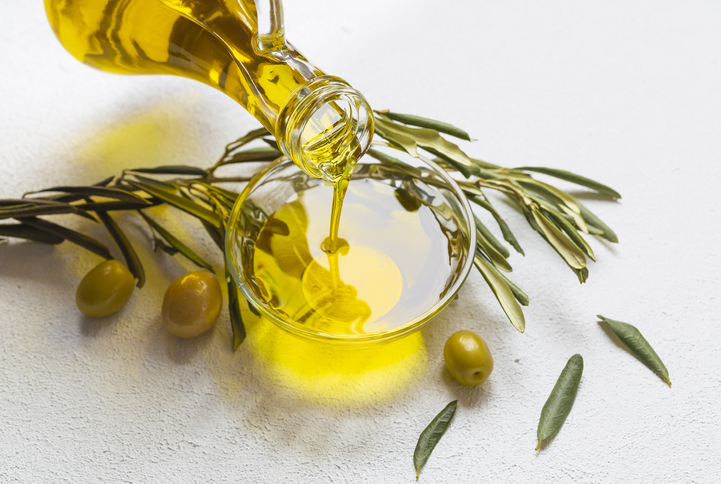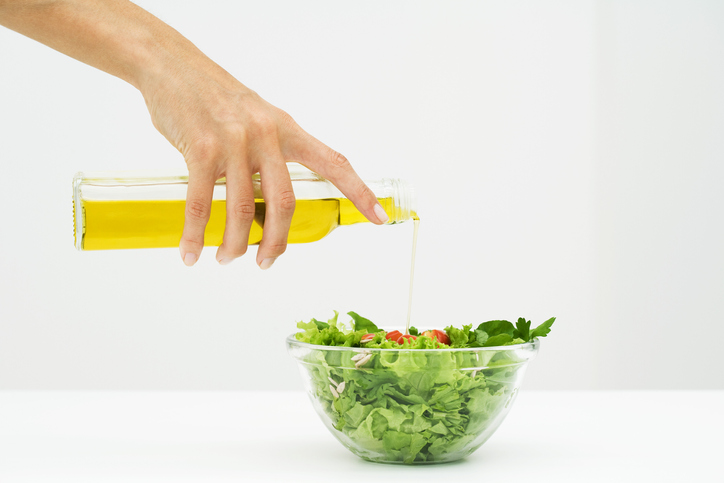Still Unsure About Making Olive Oil a Part of Your Healthy Diet? This May Convince You!

By Joy Stephenson-Laws, J.D., Founder
The good news about including olive oil in a healthy diet and lifestyle just keeps coming.
According to a study recently published by the American College of Cardiology, study participants who consumed more than about ½ tablespoon of olive daily showed a 19 percent lower risk of cardiovascular mortality, a 17 percent lower risk of cancer mortality, a 29 percent lower risk of neurodegenerative mortality and an 18 percent lower risk of respiratory mortality. Researchers also found that people who substituted about 10 grams of other fat (such as butter or mayonnaise) with olive oil showed up to a 34 percent lower risk of total and cause-specific mortality.
In this study, researchers analyzed more than 60,000 women and 31,000 men who participated in the almost 30-year Nurses’ Health Study and Health Professionals Follow-up Study. Researchers noted that participants who consumed more olive oil also tended to be more physically active and generally had healthier lifestyles that included not smoking and having a diet rich in fruits and vegetables. So, it is possible that other factors beyond consuming olive oil can help explain the health benefits identified in the study.
Olive oil has been produced for thousands of years. In fact, archeologists and historians believe that humans were producing olive oil as far back 6000 B.C. (more than 8,000 years ago). As its name implies, it is pressed from whole olives and is used for cooking, fuel, pharmaceuticals, cosmetics and even as a mechanical lubricant. How olive oil tastes will depend on how ripe the olives are when they are pressed.

In case you are wondering what the different kinds of olive that you see in the store mean, they refer to how it is processed as well as its quality. Extra virgin, for example, means that the olives were cold pressed without using any type of solvents or other methods to extract the oil. This type of olive oil, understandably, is more costly. It also has the highest levels of polyphenols, antioxidants which offer health benefits. In comparison, charcoal and other filters are used to produce refined olive oil. Another type is olive pomace oil, which has a more neutral flavor.
From a nutritional perspective, one tablespoon of olive oil has 119 calories (definitely not a low-calorie food), 13.5 grams of fat (about 21 percent of the fat you should consume in a day) and two grams of saturated fat (about nine percent of what the daily value is). It also gives you about 10 percent of the daily values of vitamin E and vitamin K. Olive oil does not have any carbohydrates, protein, or fiber.
Although not very common, there are some people who are allergic to olive oil. You should talk with a competent healthcare practitioner if you have symptoms of an allergic reaction after consuming olive oil. These may include sneezing, coughing, wheezing, diarrhea, nausea, hives, itching and rash.
Other Reasons to Consume Olive Oil
In addition to those discussed above, olive oil has been shown to have other potential health benefits, including:
- Reduced inflammation, given its oleic acid content
- Support of cognitive health
- Reduced risk of developing type 2 diabetes
- Olive oil Has antioxidant properties, which may reduce the risk of a variety of diseases
- Reduced risk of strokes
- Support of bone health
- Improved symptoms of metabolic syndrome
- Support of liver health
- Better management of blood pressure
- Support of gut health
Incorporating Olive Oil Into Your Healthy Diet
While you probably think of olive oil mostly as a salad dressing, it is far more versatile and can be incorporated into your diet in a wide variety of ways. These include:
- Cooking
- Sauteing vegetables
- Frying, especially eggs
- Using as a baking substitute for other oils
- Marinating and roasting meats and fish
- Substituting for other oils (just remember that olive oil imparts a distinctive taste), such as mayonnaise for tuna salad
- Topping or finish for vegetables, eggs, fish, pizza, potatoes, fresh breads, soups and dips
- Substituting butter on your morning toast
- Using in coffee instead of coconut oil or butter
If you decide to start using olive oil for salad dressing, it’s actually quite easy to make your own at home. Just add three parts of extra virgin olive oil to one part of your favorite vinegar and you have the base. Then just add some spices and herbs (such as basil or oregano), if you’d like, and then you’re set.
You also may have heard that olive oil can be used for skincare and even for promoting hair growth. On the former, studies do suggest that it could reduce skin inflammation. On the latter, unfortunately, while olive oil may help reduce and prevent split ends – which does make your hair look healthier – there is no evidence that it makes your hair grow.
Enjoy your healthy life!
The pH professional health care team includes recognized experts from a variety of health care and related disciplines, including physicians, attorneys, nutritionists, nurses, and certified fitness instructors. This team also includes the members of the pH Medical Advisory Board, which constantly monitors all pH programs, products, and services. To learn more about the pH Medical Advisory Board, click here.







